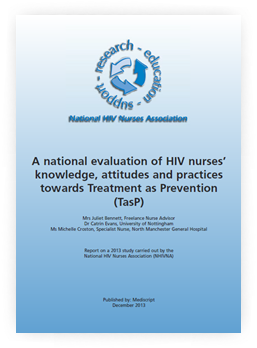Report on a 2013 study carried out by the National HIV Nurses Association (NHIVNA)
 Introduction
Introduction
There is now conclusive evidence supporting the use of antiretroviral therapy (ART) as a strategy for reducing the risk of HIV transmission. Treatment as Prevention (TasP) describes the public health or community benefits derived from this strategy. Findings from the HTPN052 study1, published in 2012, showed a significant reduction in HIV transmission in serodiscordant heterosexual couples attributed to the use of ART. As a result, international guidelines are starting to support initiating antiretroviral therapy early, with a prevention rationale2. The British HIV Association (BHIVA) now advises that healthcare professionals should proactively talk to their patients about the impact of ART on viral transmission and the possibility of starting treatment early for prevention purposes3.
Within the UK, nurses are taking leading roles in all aspects of routine HIV testing and HIV care. Successful integration of TasP, as a new initiative into standard care, will, therefore, require a wellinformed and highly skilled nursing workforce. There is currently little known about nurses’ attitudes, practices or experiences in relation to TasP. This is a gap that the study sought to fill.
